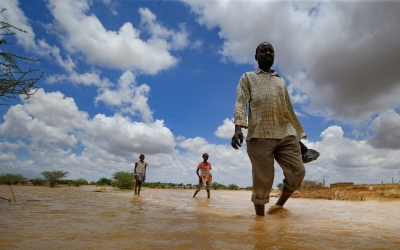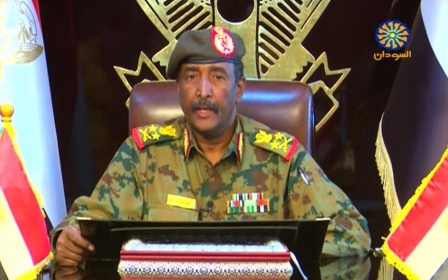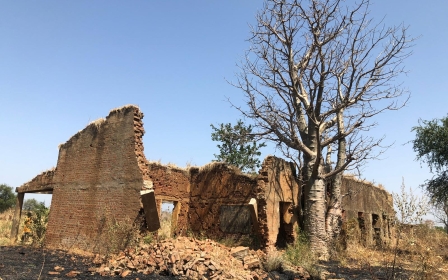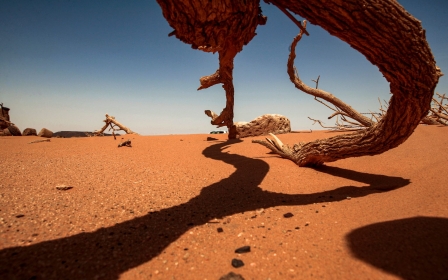Record-breaking rains wreak havoc across Sudan during pandemic
Nahid al-Hassan and her family have been taking shelter at a primary school in the suburb of al-Kalakla in the Sudanese capital Khartoum.
Just a few days ago, Hassan lost everything she owned when torrential rains and the subsequent flash floods destroyed her home.
Now crammed into a makeshift camp with thousands of others in a similar situation - during a global pandemic - she is anxious about the wellbeing of her family.
“My brother and dad had just recovered from the coronavirus 10 days ago, and then the floods hit our house and it’s now partially collapsed,” the 29-year-old told Middle East Eye.
“We don’t know how to deal with this hellfire situation,” Hassan said.
New MEE newsletter: Jerusalem Dispatch
Sign up to get the latest insights and analysis on Israel-Palestine, alongside Turkey Unpacked and other MEE newsletters
'We don’t know how to deal with this hellfire situation'
- Nahid al-Hassan, displaced person
Opposite Khartoum, on the western banks of the River Nile, the city of Omdurman has suffered an even worse fate. The floods have destroyed hundreds of houses there, leaving many stranded in inaccessible areas after main roads leading to the city were cut off.
While the local authority has set up a few locations providing shelter and food, residents say more help is needed.
“We are trying to rally the people to find resources to help feed and shelter those affected by the floods. The local administration of Omdurman has helped with a few shelters but it’s not enough,” said 32-year-old Atif Ahmed, a member of the local volunteer group the Revolutionary Committee, who told MEE that he had “lost everything” in the floods.
On Tuti Island, in between the two cities where the Blue and White Niles merge, floodwaters have demolished the local flood defences, forcing residents living along the river banks to abandon their homes.
“The civil defence, the police and the local residents have managed to evacuate people to higher ground. However we are still in need of more shelters and other forms of assistance,” Abdul-Azim Abdul-Razig, a long-time resident of the island, told MEE.
Since July, Sudan has been hit with record-breaking torrential rains and flooding, which have caused at least 100 deaths and damaged more than 140,000 homes across the country.
While flash floods are nothing new in Sudan, where the rainy season typically stretches from June to October, this year’s flooding is “one of the worst natural disasters” the country has seen in decades, according to state news agency SUNA.
In early September the government announced a three-month state of emergency and declared Sudan a “natural disaster zone”.
Government failure
Aside from the floods, Sudan is also in a deep economic crisis while trying to combat the coronavirus pandemic.
Last week, Sudanese Finance Minister Hiba Mohamed Ali announced that the government had allocated 340m Sudanese pounds ($6.15m) to help with the aftermath of the floods.
But for ordinary citizens like Hassan Ali, 40, the transitional government has failed “in various tests” related to the current crises.
“The government has failed in fighting the coronavirus and containing the impact of the floods. You see queues everywhere for bread and fuel. There’s no electricity or cooking gas and the country is about to collapse,” Ali told MEE, while sitting in front of his damaged home in Mayo, on the outskirts of Khartoum.
Sudan's transitional government, which has been in charge since the toppling of former president Omar al-Bashir last year, is reportedly considering normalising its relations with Israel in exchange for economic aid.
The package could include more than $3bn in humanitarian assistance and direct budgetary aid in order to deal with the economic crisis and the fallout from the devastating floods. There could also be a commitment by the United States and the United Arab Emirates to provide Sudan with economic aid over the next three years, Sudanese sources told the US news website Axios.
A ‘tragic’ situation
Rahma Mohamed Ibrahim, head of emergency operations at the Sudan Red Crescent, described the situation in the African country as “tragic” and said that the organisation needed at least $12m in order to assist those affected by the natural disaster.
“Sudan is really going through a difficult time right now. It didn't even have a chance to take a breather from the coronavirus pandemic before being hit by unprecedented floods,” Ibrahim said.
Sudan, whose economic crisis has led to fragile infrastructure, restricted health capabilities and a weak emergency response, is still under threat of more floods and rain in the coming period, said the United Nations.
According to the UN's latest situation report for Sudan, the floods have hit 17 out of Sudan's 18 states, affecting more than 770,000 people, most severely in Khartoum, North Darfur, West Darfur and Sennar.
“The most urgent needs are shelter, non-food items, and Wash (water, sanitation and hygiene) services. Readiness to respond to the health situation as a result of floods and vector-borne diseases is urgent,” said a joint survey made by Sudan Floods Task Force (FTF) and the United Nations Office for the Coordination of Humanitarian Affairs (OCHA).
The country has also recorded 13,555 confirmed cases of Covid-19 as of 17 September, the report said.
Furthermore, only 44 percent of the $1.6bn required for the Humanitarian Response Plan (HRP) for Sudan has been funded so far, it added.
Community spirit
The natural disaster has had the unexpected effect of uniting communities, as people from various neighbourhoods come together to help one another get through the hard times, despite a lack of government support.
Rimah Ahmed, 30, is a volunteer with the Group of Kandakas, named after Sudan's historical female rulers. She and her colleagues have been building tents for poor families in Algoba, south of Khartoum, as well as running a community kitchen to feed those affected by the floods.
“We are happy that we’re reviving our historical values and helping our people,” she told MEE.
Ahmed’s group is one of several volunteer organisations launched by Sudan’s youth to assist those in need. Others include the Revolutionary Committee and the Nafeer Initiative, which means "mass help".
“We will not wait for the government to do everything for us. We are taking these initiatives to assist our people because we know the economic situation is bad and the government is bankrupt after Bashir’s era,” Ahmed said.
Middle East Eye delivers independent and unrivalled coverage and analysis of the Middle East, North Africa and beyond. To learn more about republishing this content and the associated fees, please fill out this form. More about MEE can be found here.





